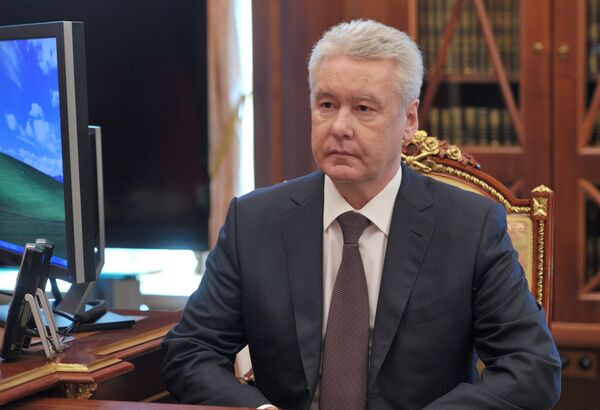MOSCOW, July 30 (RIA Novosti) – Moscow’s powerful, Kremlin-appointed mayor will likely aim to avoid public debates with his rivals for the post, including charismatic opposition leader Alexei Navalny, ahead of upcoming elections, two Russian newspapers reported Tuesday.
A spokesman for acting Mayor Sergei Sobyanin told RIA Novosti that his boss would decide whether to participate in the debates closer to their start on August 12.
The comment came in response to reports by two respected dailies, Vedomosti and Kommersant, which said earlier the same day that Sobyanin was strongly disinclined to debate Navalny, famous for his impassioned Kremlin-bashing. Both papers cited unnamed sources reportedly close to Sobyanin.
Sobyanin expects “rudeness” at debates with Navalny and wants to avoid it, Vedomosti reported, citing an unnamed source close to the acting mayor. Kommersant cited sources in Sobyanin’s campaign staff as saying he did not want to face possible “insults” from Navalny.
Navalny said in a blog post that the real “rudeness” was avoiding public debate with rivals.
Sobyanin, who has governed Moscow for three years, also has “no topic for dialogue” with his five rivals, all of them opposition politicians without a serious track record in city management, Vedomosti said.
Six rounds of debates between the six candidates are slated to take place before the election on September 8, though a mayoral hopeful has the right to decline to participate.
The debates will be aired on city-owned radio and television channels. The broadcaster said the debates would be pre-recorded due to “technical limitations,” which caused a flurry of criticism from all five opposition candidates.
“The authorities are afraid of a face-to-face conversation,” Communist Party mayoral nominee Ivan Melnikov told RIA Novosti.
Candidates from the ruling establishment rarely participate in public debates in Russia. The most prominent case is Sobyanin’s political patron, President Vladimir Putin, who never debated with his rivals during his three successful election campaigns between 2000 and 2012; neither did Sobyanin’s predecessor as Moscow mayor, Yury Luzhkov. The opposition has repeatedly accused such candidates of capitalizing on purportedly privileged exposure in state- and city-run media.
Sobyanin was appointed to his job in 2010 by then-President Dmitry Medvedev. But following a new law that reintroduced direct mayoral elections in the Russian capital, Sobyanin resigned last month, prompting the early election.


